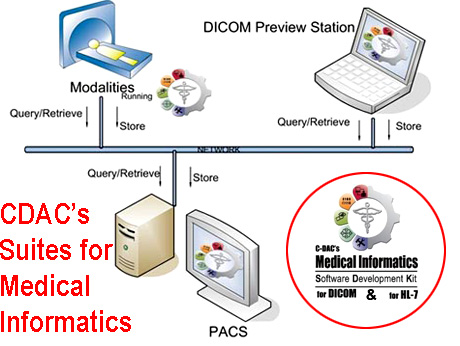Pune: The Centre for Development of Advanced Computing – C-DAC – has developed software kits that are expected to sharply reduce the development costs for Indian entrants into the burgeoning medical informatics arena.
The government-supported institution headquartered in Pune has launched separate SDKs or software development kits which will help researchers and solution developers to meet two globally mandated standards – DICOM and HL7 -- for medical information and data handling and exchange.
In lay terms, these are standards adhered to by hospitals, healthcare organizations and medical electronic equipment manufacturers. This ensures that equipments from different manufacturers can ‘ talk’ to each other – and to hospital management information systems. It also ensures that new concepts like telemedicine will work in practice: data on a patient’s heart condition, captured by one hospital or a field station, must be understood and analysed by experts in another part of the world: Medical informatics standards ensure this.
The CDAC releases are an important step ahead for the Indian medical informatics community, because, at one stroke it drastically slashes the entry level into this sector of Information Technology –driven services: many competing commercial alternatives cost upward of $ 7000 that is Rs 3.5 lakhs . The CDAC SDKs are available in multiple licensing options that could push this cost down to around Rs 20,000, IndiaTechOnline learned during a special briefing by Team Coordinator Gaur Sundar and concerned scientists at C-DAC’s Medical Informatics Group in Pune.
(ANAND PARTHASARATHY from CDAC, Pune, May 25 2009)
Background notes from Wikipedia:
"Digital Imaging and Communications in Medicine (DICOM) is a standard for handling, storing, printing, and transmitting information in medical imaging. It includes a file format definition and a network communications protocol. The communication protocol is an application protocol that uses TCP/IP to communicate between systems. DICOM files can be exchanged between two entities that are capable of receiving image and patient data in DICOM format. The National Electrical Manufacturers Association (NEMA) holds the copyright to this standard.
HL7 is an international community of healthcare subject matter experts and information scientists collaborating to create standards for the exchange, management and integration of electronic healthcare information.
Hospitals and other healthcare provider organizations typically have many different computer systems used for everything from billing records to patient tracking. All of these systems should communicate with each other (or "interface") when they receive new information but not all do so. HL7 specifies a number of flexible standards, guidelines, and methodologies by which various healthcare systems can communicate with each other".
